-
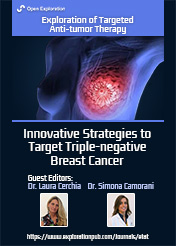 Special Issue Topic
Special Issue TopicInnovative Strategies to Target Triple-negative Breast Cancer
Submission Deadline: May 31, 2023Guest Editors
Dr. Laura Cerchia E-Mail
Institute of Experimental Endocrinology and Oncology
Research Keywords: RNA aptamer; SELEX technology; targeted therapy; targeted drug delivery; cancer theranostics; cancer cell biology and signaling; TNBC
Dr. Simona Camorani E-Mail
Institute of Experimental Endocrinology and Oncology
Research Keywords: Triple-negative breast cancer; RNA aptamers; cell-SELEX technology; cancer cell biology and signaling; targeted therapy; targeted delivery system; chemotherapy resistance; cancer immunotherapy
About the Special Issue
Triple-negative breast cancer (TNBC), which represents approximately 15-20% of all diagnosed breast cancers, has a distinctly aggressive nature, high risk for recurrence and poor prognosis. TNBC lacks expression of estrogen receptor, progesterone receptor, and human epidermal growth factor receptor 2 (HER2), thus TNBC patients are not eligible for hormone or anti-HER2 therapies. Neoadjuvant chemotherapy is the standard of care for many TNBC patients but about 30-50% develop resistance. While the overall mortality for breast cancer has recently declined, management of TNBC is still challenging because of its high biological/clinical heterogeneity and the limited targeted therapies that are available for restricted groups of patients. These include: 1) PARP inhibitors (Olaparib or Talazoparib) for BRCA-mutated patients; 2) anti-PD-L1 (Atezolizumab) or anti-PD-1 (Pembrolizumab) monoclonal antibodies, in combination with chemotherapy, for patients with unresectable locally advanced or metastatic PD-L1-positive TNBC and 3) the antibody-drug conjugate (Sacituzumab govitecan), recently approved for patients with metastatic TNBC expressing anti-trophoblast cell-surface antigen.
TNBC has an urgent therapeutic need. This Special Issue invites original research articles and timely reviews on all aspects regarding innovative strategies to target triple-negative breast cancer, highlighting problems, solutions and future directions in the development of new therapeutic approaches.
Keywords: Molecular heterogeneity; tumor microenvironment; novel targets; active cancer targeting; mechanisms of drug resistance; immunotherapy and combination treatments; antibody-based therapeutics; aptamer-based targeted therapies
Published Articles
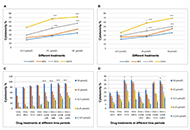 Evaluation of molecular effects associated with apoptosis, tumour progression, angiogenesis and metastasis by a novel combination of drugs with ormeloxifene in triple negative breast cancer cellsOpen AccessOriginal ArticleAim: To investigate the molecular effects of a novel combination [sertraline and plumbagin (comb) with ormeloxifene (Orm)] for anticancer activity in triple negative breast cancer cell line “MD [...] Read more.Shehna Sharaf ... Lakshmi SPublished: June 11, 2024 Explor Target Antitumor Ther. 2024;5:551–567
Evaluation of molecular effects associated with apoptosis, tumour progression, angiogenesis and metastasis by a novel combination of drugs with ormeloxifene in triple negative breast cancer cellsOpen AccessOriginal ArticleAim: To investigate the molecular effects of a novel combination [sertraline and plumbagin (comb) with ormeloxifene (Orm)] for anticancer activity in triple negative breast cancer cell line “MD [...] Read more.Shehna Sharaf ... Lakshmi SPublished: June 11, 2024 Explor Target Antitumor Ther. 2024;5:551–567
DOI: https://doi.org/10.37349/etat.2024.00235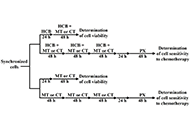 Hexachlorobenzene as a differential modulator of the conventional and metronomic chemotherapy response in triple negative breast cancer cellsOpen AccessOriginal ArticleAim: Triple negative breast cancer (TNBC) is usually treated with high doses of paclitaxel, whose effectiveness may be modulated by the action of environmental contaminants such as hexachlorobenz [...] Read more.Yamila Sanchez ... Alejandro EspañolPublished: March 21, 2024 Explor Target Antitumor Ther. 2024;5:278–295
Hexachlorobenzene as a differential modulator of the conventional and metronomic chemotherapy response in triple negative breast cancer cellsOpen AccessOriginal ArticleAim: Triple negative breast cancer (TNBC) is usually treated with high doses of paclitaxel, whose effectiveness may be modulated by the action of environmental contaminants such as hexachlorobenz [...] Read more.Yamila Sanchez ... Alejandro EspañolPublished: March 21, 2024 Explor Target Antitumor Ther. 2024;5:278–295
DOI: https://doi.org/10.37349/etat.2024.00218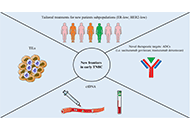 Early-stage triple negative breast cancer: the therapeutic role of immunotherapy and the prognostic value of pathological complete responseOpen AccessReviewTriple negative breast cancer (TNBC) represents an aggressive disease associated with a high risk of recurrence after curative treatment and a poor prognosis in the metastatic setting. Chemotherapy [...] Read more.Pierluigi De Santis ... Palma FedelePublished: February 28, 2024 Explor Target Antitumor Ther. 2024;5:232–250
Early-stage triple negative breast cancer: the therapeutic role of immunotherapy and the prognostic value of pathological complete responseOpen AccessReviewTriple negative breast cancer (TNBC) represents an aggressive disease associated with a high risk of recurrence after curative treatment and a poor prognosis in the metastatic setting. Chemotherapy [...] Read more.Pierluigi De Santis ... Palma FedelePublished: February 28, 2024 Explor Target Antitumor Ther. 2024;5:232–250
DOI: https://doi.org/10.37349/etat.2024.00215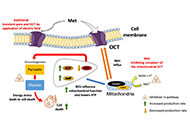 Efficacy of metformin and electrical pulses in breast cancer MDA-MB-231 cellsOpen AccessOriginal ArticleAim: Triple-negative breast cancer (TNBC) is a very aggressive subset of breast cancer, with limited treatment options, due to the lack of three commonly targeted receptors, which merits the need [...] Read more.Praveen Sahu ... Raji SundararajanPublished: February 19, 2024 Explor Target Antitumor Ther. 2024;5:54–73
Efficacy of metformin and electrical pulses in breast cancer MDA-MB-231 cellsOpen AccessOriginal ArticleAim: Triple-negative breast cancer (TNBC) is a very aggressive subset of breast cancer, with limited treatment options, due to the lack of three commonly targeted receptors, which merits the need [...] Read more.Praveen Sahu ... Raji SundararajanPublished: February 19, 2024 Explor Target Antitumor Ther. 2024;5:54–73
DOI: https://doi.org/10.37349/etat.2024.00204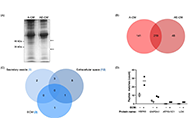 Identification of lysyl oxidase as an adipocyte-secreted mediator that promotes a partial mesenchymal-to-epithelial transition in MDA-MB-231 cellsOpen AccessOriginal ArticleAim: Breast cancer (BC) is the most common cancer in women worldwide, where adiposity has been linked to BC morbidity. In general, obese premenopausal women diagnosed with triple-negative BC (TNB [...] Read more.Cassidy M. Van Stiphout ... Alicia M. Viloria-PetitPublished: January 16, 2024 Explor Target Antitumor Ther. 2024;5:1–19
Identification of lysyl oxidase as an adipocyte-secreted mediator that promotes a partial mesenchymal-to-epithelial transition in MDA-MB-231 cellsOpen AccessOriginal ArticleAim: Breast cancer (BC) is the most common cancer in women worldwide, where adiposity has been linked to BC morbidity. In general, obese premenopausal women diagnosed with triple-negative BC (TNB [...] Read more.Cassidy M. Van Stiphout ... Alicia M. Viloria-PetitPublished: January 16, 2024 Explor Target Antitumor Ther. 2024;5:1–19
DOI: https://doi.org/10.37349/etat.2024.00201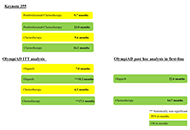 Facing the conundrum: which first-line therapy should be used for patients with metastatic triple-negative breast cancer carrying germline BRCA mutation?Open AccessPerspectivePembrolizumab combined with chemotherapy has been established as the preferred first-line therapy for treating metastatic triple-negative breast cancer (mTNBC) with programmed cell death ligand-1 (P [...] Read more.Sabah Alaklabi ... Shipra GandhiPublished: December 27, 2023 Explor Target Antitumor Ther. 2023;4:1301–1309
Facing the conundrum: which first-line therapy should be used for patients with metastatic triple-negative breast cancer carrying germline BRCA mutation?Open AccessPerspectivePembrolizumab combined with chemotherapy has been established as the preferred first-line therapy for treating metastatic triple-negative breast cancer (mTNBC) with programmed cell death ligand-1 (P [...] Read more.Sabah Alaklabi ... Shipra GandhiPublished: December 27, 2023 Explor Target Antitumor Ther. 2023;4:1301–1309
DOI: https://doi.org/10.37349/etat.2023.00198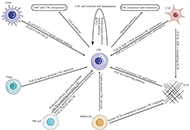 Targeting cancer stem cell plasticity in triple-negative breast cancerOpen AccessReviewTriple-negative breast cancer (TNBC) is a highly aggressive breast cancer subtype with limited treatment options. Cancer stem cells (CSCs) are thought to play a crucial role in TNBC progression and [...] Read more.Zhengwang Guo, Shuyan HanPublished: December 11, 2023 Explor Target Antitumor Ther. 2023;4:1165–1181
Targeting cancer stem cell plasticity in triple-negative breast cancerOpen AccessReviewTriple-negative breast cancer (TNBC) is a highly aggressive breast cancer subtype with limited treatment options. Cancer stem cells (CSCs) are thought to play a crucial role in TNBC progression and [...] Read more.Zhengwang Guo, Shuyan HanPublished: December 11, 2023 Explor Target Antitumor Ther. 2023;4:1165–1181
DOI: https://doi.org/10.37349/etat.2023.00190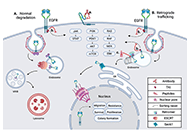 Nuclear epidermal growth factor receptor as a therapeutic targetOpen AccessReviewEpidermal growth factor receptor (EGFR) is one of the most well-studied oncogenes with roles in proliferation, growth, metastasis, and therapeutic resistance. This intense study has led to the devel [...] Read more.Benjamin Atwell ... Joyce SchroederPublished: August 30, 2023 Explor Target Antitumor Ther. 2023;4:616–629
Nuclear epidermal growth factor receptor as a therapeutic targetOpen AccessReviewEpidermal growth factor receptor (EGFR) is one of the most well-studied oncogenes with roles in proliferation, growth, metastasis, and therapeutic resistance. This intense study has led to the devel [...] Read more.Benjamin Atwell ... Joyce SchroederPublished: August 30, 2023 Explor Target Antitumor Ther. 2023;4:616–629
DOI: https://doi.org/10.37349/etat.2023.00156 -
-
Ongoing Special Issues
-
Completed Special Issues